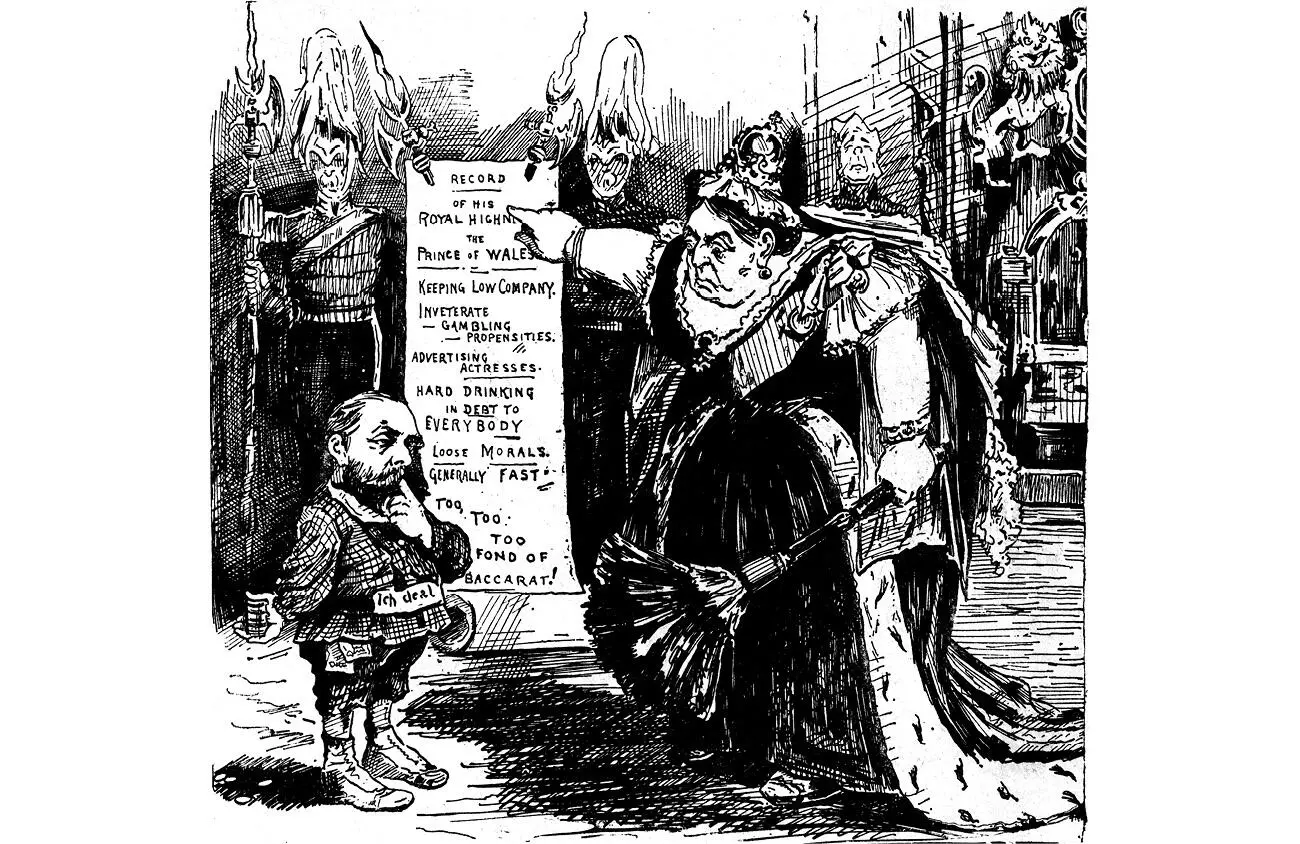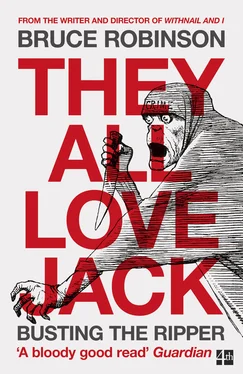1 ...7 8 9 11 12 13 ...17 My interest in Cleveland Street isn’t limited to the sordid activities within, but includes the almost inconceivable criminal activity without. By the late 1880s the Victorian Establishment had become so profligate, so craven, that scandal was hissing everywhere, rupturing through the upper classes like air from a perished ball. Home Office staff were forever being rushed off their feet in a frenzy of patching, and repackaging black as a very dark shade of white. The rules had to be violated, manipulated, cheated and debased. In this case the law had to be made a whore to save the royal arse.
This industry of unworthiness was the responsibility of the Home Secretary, Henry Matthews QC, commandant of the legal machine and its venal army of brown-nosed lawyers, lackeys and High Court judges. Like the military in their ursine headwear, these medieval-looking potentates under three and a half pounds of horsehair gurgled the draconian enactments of Victoria’s statutes.
One such judge, James Fitzjames Stephen, who in due course will feature at the extreme peripheries of his paymaster’s wickedness, had an oblique connection with Cleveland Street. His son, James Kenneth Stephen, was tutor and off-peak lover to the Duke of Clarence. He was also a publisher of verses. As Oscar Wilde remarked when bitching about a similar talent, ‘He has nothing to say, and says it.’ Wilde was referring to Henry Somerset, an aristocratic second-rate melodist whose brother and co-buggerer Lord Arthur Somerset is to have some prominence in this story.
Somerset was a close pal of the Prince of Wales,42 and the Prince’s son, the Duke of Clarence, was a pal of Commissioner of the Metropolitan Police Sir Charles Warren. The Commissioner was actually a house-guest at Sandringham Palace in Norfolk for the celebrations of Clarence’s twenty-fourth birthday in January 1888.43 I don’t know if J.K. Stephen was there, but when Edward inadvertently got busted at an illegal gambling den, the police were chastened, and J.K.’s father was on hand to clarify what ‘illegal’ actually meant.
‘It is occasionally said,’ observed Judge James Fitzjames Stephen, ‘that the law as it stands exhibits practical partiality in the odious form of undue leniency to the rich in comparison with the poor. How can it be just, it is said, that the Prince of Wales and other people of the highest rank should go to Mr Wilson’s [gambling house] and play baccarat with impunity, whilst the newspapers are continually filled with accounts of raids upon gambling houses which do not do a tenth part of the harm? The answer, of course, is plain. There is all the difference in the world between keeping a house in which everyone may gamble, and private gambling which no one can share in without special invitation.’44
In other words, a gentleman may ‘invite’ another to break the law, and be within the law by doing it, but if the culprit is not a gentleman and was not ‘invited’, the law must make a very necessary social adjustment.
‘It is true,’ hawked Justice Stephen, ‘that under 36 and 37 Vict. s. 3. that any man who plays or bets in any street, road, highway, or other public place with any cards or instruments of gaming … is a rogue and vagabond, and as such may be imprisoned by a magistrate for three months.’

A king to be gets a cartoon, and a common man a cell. This apparently went down all right in West End drawing rooms and the more affluent Freemasonic lodges, but didn’t cut it so favourably for Masons in the United States.
Edward, Prince of Wales was Grand Master of the Grand Lodge of England, and thus the most powerful Freemason on earth. But omnipotence did not faze the Yanks. They’d got rid of kings and kingdoms almost everywhere, except in their Bibles: ‘The Prince of Wales, as Grand Master of the Grand Lodge of England, should, in the opinion of many, be charged with conduct unbecoming in a Mason.’ That was from the Rough Ashlar .45 Another title, the Masonic Constellation , threw an even bigger rock: ‘What will the Masons do in the matter? Cringe at the feet of such an unworthy person; lick the spittles that fall from such unworthy lips? … The Fraternity in America should take some decisive steps in the matter of the disgrace that he had brought upon the Craft … A common gambler and rake … Strip the tarnished jewels from his breast, try him for gambling and adultery, and expel him from their halls.’46
All I can say to that is, dream on. The hysteria from the colonies was not only disingenuous, it was naïve – the intention of the British Masons being precisely the opposite. This American seemed to have forgotten who was running the place. He had even more to say, but he was wasting his time: ‘It is the duty of Masons in England to guard with jealous care the purity and high standing of our loved order. There is no palliation or mitigation in such cases, and those who shield or protect are equally guilty.’47
You can say that again. But nobody ever did. The ‘equally guilty’ responsible for shielding and protecting fellow criminals in the matter of scandal (at Cleveland Street, for example) were, almost to a man, eminent members of the ‘loved order’.
Condemnation of the Prince of Wales was not restricted to American Freemasons. It also came from the British public. They wrote letters to the authorities, the newspapers and the police. There was irate criticism even from a famous murderer – the following came from ‘Jack the Ripper’, or at least from a correspondent signing himself thus: ‘A word of warning, beware, and protect your low immoral pot-bellied prince. God has marked him for destruction and “mutilation”.’
Not exactly an echo of the popular press, though Fleet Street wasn’t friendly either. All in all, it was another lousy day in utopia.
But this little fracas for Edward was as nothing – wasn’t even a pimple on the bum – to the truly awful scandal that had come down the pike but twelve months before, and threatened to destroy his son.
An oppressive fact about the Victorian ruling estate was its isolation. You were in it, or you were not. Its encircling walls weren’t entirely visible until you ran into one. Then they were high and hard. The upper classes could slam a door in your face that you couldn’t even see. It is another fact, similarly invisible, that perhaps as few as 10,000 members of this class ran the affairs of 310 million people.
Reading its contemporary journals and dainty lady-press, the claustrophobia (I want to say incestuousness) of the Victorian elite seems remarkable. It seemed that everyone knew everyone, and everyone knew everyone else. The upper classes gave an illusion of living in one enormous mansion, residing there like superior strangers, and existing only for garden parties and fireworks around the lake. Blood (no matter how thin) or money (and a lot of it) were the only ways in. Though from time to time, of course, the System absorbed those on whom its survival relied: the bishops and lawyers, the judges and generals, and Commissioners of the Metropolitan Police.
Plus, there were those it slept with or who otherwise amused it, people toys, like Lillie Langtry or Oscar Wilde.
Edward, Prince of Wales was a philistine who didn’t give much for their product, but loved the company of artists. Two of the most celebrated of the age were close personal friends: the little composer with his peculiarly British talent Sir Arthur Sullivan, and a true giant of his epoch, the painter Sir Frederick Leighton.
Both of these complimentary-ticket holders of the upper class (like Oscar Wilde) were Freemasons, as were a staggering number of the class they entertained.
Читать дальше












